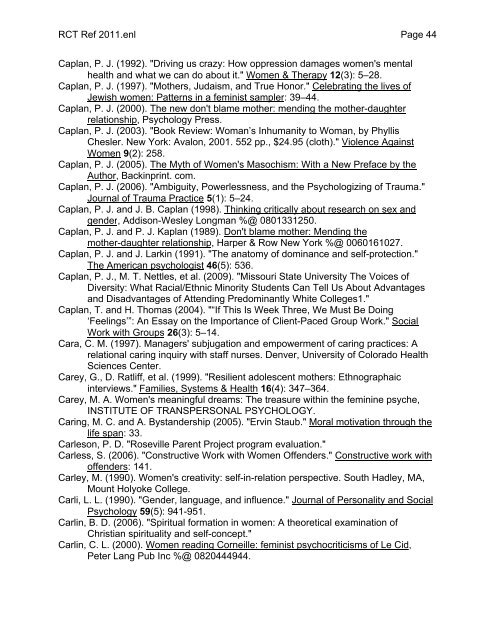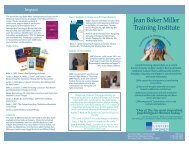- Page 1 and 2: RCT Ref 2011.enl Page 1 Aasen, P. R
- Page 3 and 4: RCT Ref 2011.enl Page 3 Adams, L. G
- Page 5 and 6: RCT Ref 2011.enl Page 5 Alpert, J.
- Page 7 and 8: RCT Ref 2011.enl Page 7 Anderson, S
- Page 9 and 10: RCT Ref 2011.enl Page 9 Aronson, J.
- Page 11 and 12: RCT Ref 2011.enl Page 11 Avis, J. M
- Page 13 and 14: RCT Ref 2011.enl Page 13 Ballou, M.
- Page 15 and 16: RCT Ref 2011.enl Page 15 Barnett, L
- Page 17 and 18: RCT Ref 2011.enl Page 17 Baumeister
- Page 19 and 20: RCT Ref 2011.enl Page 19 Bellingrer
- Page 21 and 22: RCT Ref 2011.enl Page 21 Bergman, S
- Page 23 and 24: RCT Ref 2011.enl Page 23 Beyerle, S
- Page 25 and 26: RCT Ref 2011.enl Page 25 Repression
- Page 27 and 28: RCT Ref 2011.enl Page 27 Blumenfeld
- Page 29 and 30: RCT Ref 2011.enl Page 29 Bontatibus
- Page 31 and 32: RCT Ref 2011.enl Page 31 Boyle, M.
- Page 33 and 34: RCT Ref 2011.enl Page 33 Briere, J.
- Page 35 and 36: RCT Ref 2011.enl Page 35 Brothers,
- Page 37 and 38: RCT Ref 2011.enl Page 37 Browne, A.
- Page 39 and 40: RCT Ref 2011.enl Page 39 Bukowski,
- Page 41 and 42: RCT Ref 2011.enl Page 41 Butzel, J.
- Page 43: RCT Ref 2011.enl Page 43 Campbell,
- Page 47 and 48: RCT Ref 2011.enl Page 47 Cast, A. D
- Page 49 and 50: RCT Ref 2011.enl Page 49 Charney, R
- Page 51 and 52: RCT Ref 2011.enl Page 51 Chodorow,
- Page 53 and 54: RCT Ref 2011.enl Page 53 Clark, M.
- Page 55 and 56: RCT Ref 2011.enl Page 55 Coll, C. G
- Page 57 and 58: RCT Ref 2011.enl Page 57 Connection
- Page 59 and 60: RCT Ref 2011.enl Page 59 Cottle, T.
- Page 61 and 62: RCT Ref 2011.enl Page 61 Crenshaw,
- Page 63 and 64: RCT Ref 2011.enl Page 63 Cunningham
- Page 65 and 66: RCT Ref 2011.enl Page 65 Daubman, K
- Page 67 and 68: RCT Ref 2011.enl Page 67 Dean, M. J
- Page 69 and 70: RCT Ref 2011.enl Page 69 Dewey, J.,
- Page 71 and 72: RCT Ref 2011.enl Page 71 Do, C. (20
- Page 73 and 74: RCT Ref 2011.enl Page 73 Ducey, B.
- Page 75 and 76: RCT Ref 2011.enl Page 75 Eagly, A.
- Page 77 and 78: RCT Ref 2011.enl Page 77 Eldridge,
- Page 79 and 80: RCT Ref 2011.enl Page 79 Erskine, R
- Page 81 and 82: RCT Ref 2011.enl Page 81 Falk, S. (
- Page 83 and 84: RCT Ref 2011.enl Page 83 Fenwick, T
- Page 85 and 86: RCT Ref 2011.enl Page 85 Fisher, V.
- Page 87 and 88: RCT Ref 2011.enl Page 87 Fogler, J.
- Page 89 and 90: RCT Ref 2011.enl Page 89 France, S.
- Page 91 and 92: RCT Ref 2011.enl Page 91 Freymond,
- Page 93 and 94: RCT Ref 2011.enl Page 93 Galligan,
- Page 95 and 96:
RCT Ref 2011.enl Page 95 Geissinger
- Page 97 and 98:
RCT Ref 2011.enl Page 97 Gersick, C
- Page 99 and 100:
RCT Ref 2011.enl Page 99 Gilgun, J.
- Page 101 and 102:
RCT Ref 2011.enl Page 101 Girshick,
- Page 103 and 104:
RCT Ref 2011.enl Page 103 Golden, G
- Page 105 and 106:
RCT Ref 2011.enl Page 105 Goodman,
- Page 107 and 108:
RCT Ref 2011.enl Page 107 Gramling,
- Page 109 and 110:
RCT Ref 2011.enl Page 109 Grenier,
- Page 111 and 112:
RCT Ref 2011.enl Page 111 Gunnarson
- Page 113 and 114:
RCT Ref 2011.enl Page 113 Hall, J.
- Page 115 and 116:
RCT Ref 2011.enl Page 115 Hardy-Fan
- Page 117 and 118:
RCT Ref 2011.enl Page 117 Harter, S
- Page 119 and 120:
RCT Ref 2011.enl Page 119 Havens, J
- Page 121 and 122:
RCT Ref 2011.enl Page 121 Hekman, S
- Page 123 and 124:
RCT Ref 2011.enl Page 123 Hershey,
- Page 125 and 126:
RCT Ref 2011.enl Page 125 Hirsch, B
- Page 127 and 128:
RCT Ref 2011.enl Page 127 Holland,
- Page 129 and 130:
RCT Ref 2011.enl Page 129 Houghtale
- Page 131 and 132:
RCT Ref 2011.enl Page 131 Hurcom, C
- Page 133 and 134:
RCT Ref 2011.enl Page 133 Ivey, A.
- Page 135 and 136:
RCT Ref 2011.enl Page 135 Jasper, K
- Page 137 and 138:
RCT Ref 2011.enl Page 137 Johnson,
- Page 139 and 140:
RCT Ref 2011.enl Page 139 Jordan, J
- Page 141 and 142:
RCT Ref 2011.enl Page 141 Jordan, J
- Page 143 and 144:
RCT Ref 2011.enl Page 143 Kagan, R.
- Page 145 and 146:
RCT Ref 2011.enl Page 145 Kaplan, H
- Page 147 and 148:
RCT Ref 2011.enl Page 147 Katz, M.
- Page 149 and 150:
RCT Ref 2011.enl Page 149 Keller, T
- Page 151 and 152:
RCT Ref 2011.enl Page 151 Kessler,
- Page 153 and 154:
RCT Ref 2011.enl Page 153 Kitzinger
- Page 155 and 156:
RCT Ref 2011.enl Page 155 Knudson-M
- Page 157 and 158:
RCT Ref 2011.enl Page 157 Kosnik, C
- Page 159 and 160:
RCT Ref 2011.enl Page 159 Kulish, N
- Page 161 and 162:
RCT Ref 2011.enl Page 161 Laird, J.
- Page 163 and 164:
RCT Ref 2011.enl Page 163 Larkin, J
- Page 165 and 166:
RCT Ref 2011.enl Page 165 LeBlanc,
- Page 167 and 168:
RCT Ref 2011.enl Page 167 Leonard,
- Page 169 and 170:
RCT Ref 2011.enl Page 169 Levit, D.
- Page 171 and 172:
RCT Ref 2011.enl Page 171 Lindner,
- Page 173 and 174:
RCT Ref 2011.enl Page 173 Loewenste
- Page 175 and 176:
RCT Ref 2011.enl Page 175 Lundin, A
- Page 177 and 178:
RCT Ref 2011.enl Page 177 MacDonald
- Page 179 and 180:
RCT Ref 2011.enl Page 179 Mahlstedt
- Page 181 and 182:
RCT Ref 2011.enl Page 181 Marecek,
- Page 183 and 184:
RCT Ref 2011.enl Page 183 Mary Sorm
- Page 185 and 186:
RCT Ref 2011.enl Page 185 McCann, L
- Page 187 and 188:
RCT Ref 2011.enl Page 187 McIntosh,
- Page 189 and 190:
RCT Ref 2011.enl Page 189 Meacham,
- Page 191 and 192:
RCT Ref 2011.enl Page 191 Messina,
- Page 193 and 194:
RCT Ref 2011.enl Page 193 Miller, J
- Page 195 and 196:
RCT Ref 2011.enl Page 195 Miller, J
- Page 197 and 198:
RCT Ref 2011.enl Page 197 Minsky, R
- Page 199 and 200:
RCT Ref 2011.enl Page 199 Mollon, P
- Page 201 and 202:
RCT Ref 2011.enl Page 201 Morgan, G
- Page 203 and 204:
RCT Ref 2011.enl Page 203 Munhall,
- Page 205 and 206:
RCT Ref 2011.enl Page 205 disorder
- Page 207 and 208:
RCT Ref 2011.enl Page 207 Nesto, B.
- Page 209 and 210:
RCT Ref 2011.enl Page 209 Northrup,
- Page 211 and 212:
RCT Ref 2011.enl Page 211 Oakley, A
- Page 213 and 214:
RCT Ref 2011.enl Page 213 O'Leary,
- Page 215 and 216:
RCT Ref 2011.enl Page 215 O'Toole,
- Page 217 and 218:
RCT Ref 2011.enl Page 217 Parker, L
- Page 219 and 220:
RCT Ref 2011.enl Page 219 Peck, J.
- Page 221 and 222:
RCT Ref 2011.enl Page 221 Peteet, J
- Page 223 and 224:
RCT Ref 2011.enl Page 223 Pitzner,
- Page 225 and 226:
RCT Ref 2011.enl Page 225 Poulsen,
- Page 227 and 228:
RCT Ref 2011.enl Page 227 Qeller, Q
- Page 229 and 230:
RCT Ref 2011.enl Page 229 Raj, A.,
- Page 231 and 232:
RCT Ref 2011.enl Page 231 Readings,
- Page 233 and 234:
RCT Ref 2011.enl Page 233 Reuber, M
- Page 235 and 236:
RCT Ref 2011.enl Page 235 Riger, S.
- Page 237 and 238:
RCT Ref 2011.enl Page 237 Roberts,
- Page 239 and 240:
RCT Ref 2011.enl Page 239 Rogers, M
- Page 241 and 242:
RCT Ref 2011.enl Page 241 Rosen, B.
- Page 243 and 244:
RCT Ref 2011.enl Page 243 Rubel, B.
- Page 245 and 246:
RCT Ref 2011.enl Page 245 Sadowski,
- Page 247 and 248:
RCT Ref 2011.enl Page 247 Sandberg,
- Page 249 and 250:
RCT Ref 2011.enl Page 249 Sazama, J
- Page 251 and 252:
RCT Ref 2011.enl Page 251 Schneider
- Page 253 and 254:
RCT Ref 2011.enl Page 253 Searle-Wh
- Page 255 and 256:
RCT Ref 2011.enl Page 255 Shaffer,
- Page 257 and 258:
RCT Ref 2011.enl Page 257 Sheldon,
- Page 259 and 260:
RCT Ref 2011.enl Page 259 Siegel, R
- Page 261 and 262:
RCT Ref 2011.enl Page 261 on women
- Page 263 and 264:
RCT Ref 2011.enl Page 263 Sloven, J
- Page 265 and 266:
RCT Ref 2011.enl Page 265 musculosk
- Page 267 and 268:
RCT Ref 2011.enl Page 267 Sparrow,
- Page 269 and 270:
RCT Ref 2011.enl Page 269 Stablein,
- Page 271 and 272:
RCT Ref 2011.enl Page 271 Steinberg
- Page 273 and 274:
RCT Ref 2011.enl Page 273 Stiver, I
- Page 275 and 276:
RCT Ref 2011.enl Page 275 Strauss,
- Page 277 and 278:
RCT Ref 2011.enl Page 277 Sutphin,
- Page 279 and 280:
RCT Ref 2011.enl Page 279 Tanaka, J
- Page 281 and 282:
RCT Ref 2011.enl Page 281 Taylor, K
- Page 283 and 284:
RCT Ref 2011.enl Page 283 Thomson,
- Page 285 and 286:
RCT Ref 2011.enl Page 285 Tosone, C
- Page 287 and 288:
RCT Ref 2011.enl Page 287 Turner, M
- Page 289 and 290:
RCT Ref 2011.enl Page 289 Ussher, J
- Page 291 and 292:
RCT Ref 2011.enl Page 291 Vanderwoe
- Page 293 and 294:
RCT Ref 2011.enl Page 293 multidisc
- Page 295 and 296:
RCT Ref 2011.enl Page 295 Wall, A.
- Page 297 and 298:
RCT Ref 2011.enl Page 297 Washburn,
- Page 299 and 300:
RCT Ref 2011.enl Page 299 Wechsler,
- Page 301 and 302:
RCT Ref 2011.enl Page 301 Wells, M.
- Page 303 and 304:
RCT Ref 2011.enl Page 303 White, J.
- Page 305 and 306:
RCT Ref 2011.enl Page 305 Williams,
- Page 307 and 308:
RCT Ref 2011.enl Page 307 Women, C.
- Page 309 and 310:
RCT Ref 2011.enl Page 309 Wu, J. (1
- Page 311 and 312:
RCT Ref 2011.enl Page 311 Zayas, L.
- Page 313:
RCT Ref 2011.enl Page 313 Zunkel, G



